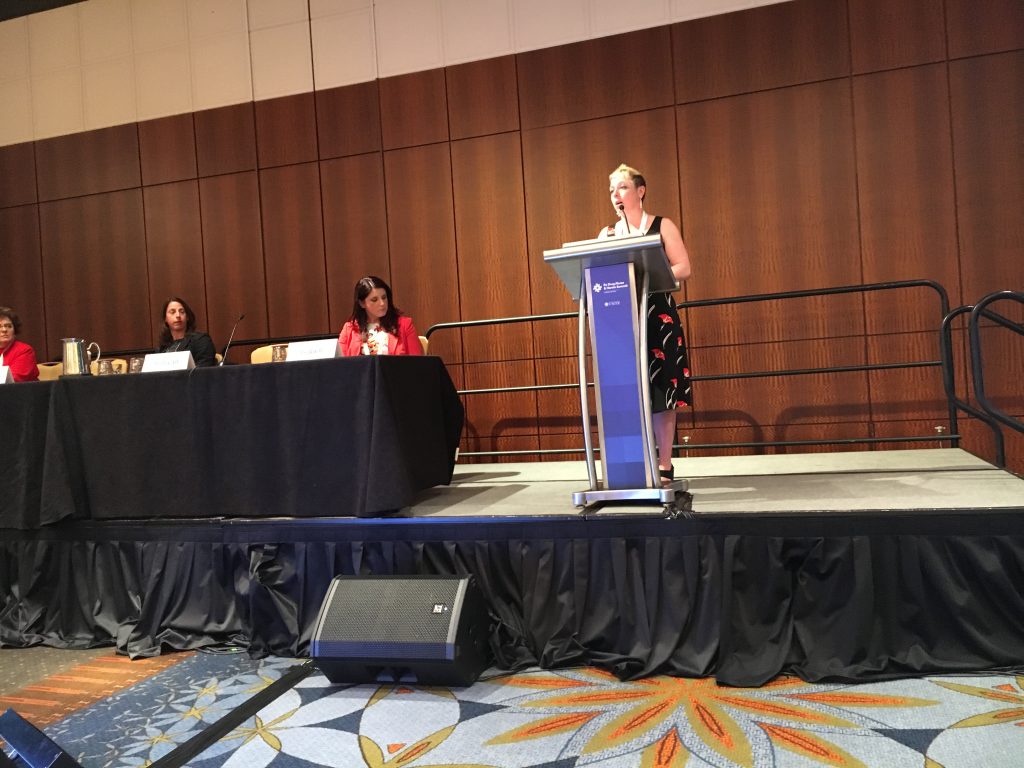At the opening plenary on the first day of the RX Drug Abuse & Heroin Summit in Atlanta, Hampshire County’s Drug Addiction Response Team program was among nine initiatives around the country spotlighted as promising community responses in the fight against opioid deaths.
After J. Cherry Sullivan, coordinator for Hampshire HOPE, the countywide opioid prevention coalition housed in the Northampton Health Department, offered up the details of the DART Program to about 1,300 people attending the community response showcase, and some asked questions regarding funding and working with the addicted population.
The Hampshire County DART teams receive small federal grants that are channeled to them via Hampshire HOPE, money which tends to cover training and overtime costs, Sullivan said. She also acknowledged that the arrangement is one that must evolve. “What we envision is that this becomes part of the culture of all 20 departments,” in the county.
She said some people who use opioids are sometimes fearful of working with police, which can be a challenge. “It takes time to build trust,” she said.
Some people within drug-using communities have long-standing relationships with police officers, while others are clearly reticent. In those cases, police seek to build trust working in partnership with recovery coaches and people schooled in harm reduction approaches.
The DART program first launched in Northampton in February of 2016, expanding to 20 other Hampshire County communities in 2018. It sends teams of police, harm reduction educators, and recovery coaches out to visit with people who have recently survived an opioid overdose, aiming to talk and build relationships.
Sullivan explained that the program was born out of a desire to save lives.
“Every non-fatal overdose is an opportunity for some sort of intervention, some sort of connection with people, and we really wanted to capitalize on that moment,” Sullivan said.
In Massachusetts, she noted, 1 in 10 people will die within two years after a non-fatal overdose.
Another risk-laden time is when people have been released from jail, so DART members reach out to people upon release.
“They are 120 times more likely to die than then general population and that’s not OK,” said Sullivan.
Other programs presented at the showcase included Trauma Lens Care, in Arizona.
Nurse Stacey Gagnon created the program as a way to reach children whose lives are impacted by parents using opioids. She said she was inspired by her work teaching inmates in jails parenting skills. She said in her discussions with them she was struck that most of them had experienced intense family trauma in childhood and also had used alcohol and other drugs at very early ages, an average of 8 for alcohol and 12 for other drugs.
“As a nurse, I understand the developing brain and I understand the desire to use substances to escape internal pain,” she said. “Our war is against childhood trauma, and I truly believe this.”
The Trauma Lens Care works with school teachers to build skills in creating trauma informed classroom environments for children who have experiences opioid use-related traumas.
Laurie Loisel, director of outreach and education at the office of Northwestern District Attorney David E. Sullivan, is accompanying the Hampshire HOPE delegation at the RX Drug & Heroin Summit as a guest of Hampshire HOPE specifically to file news reports out of the conference.



